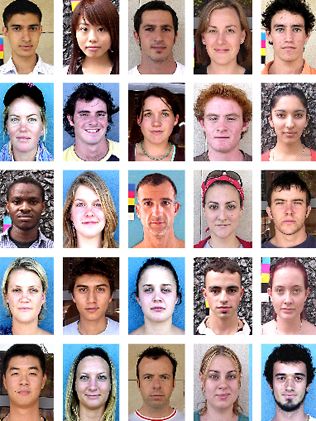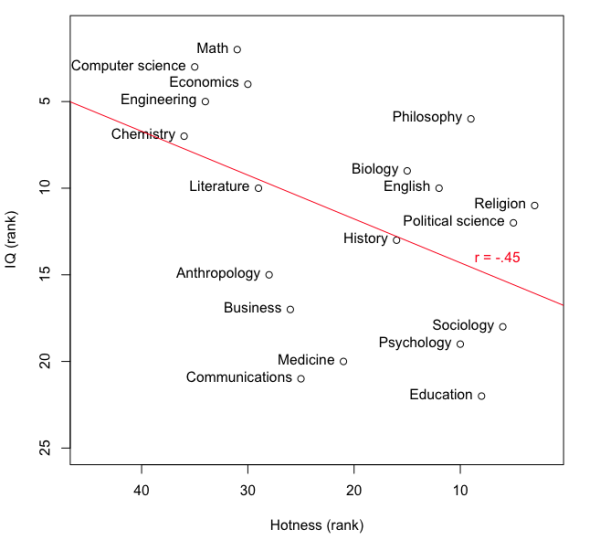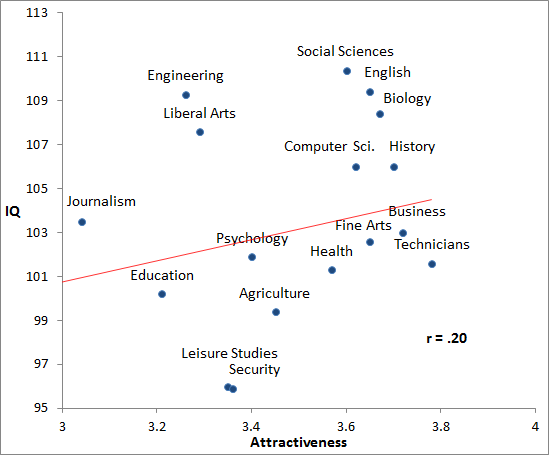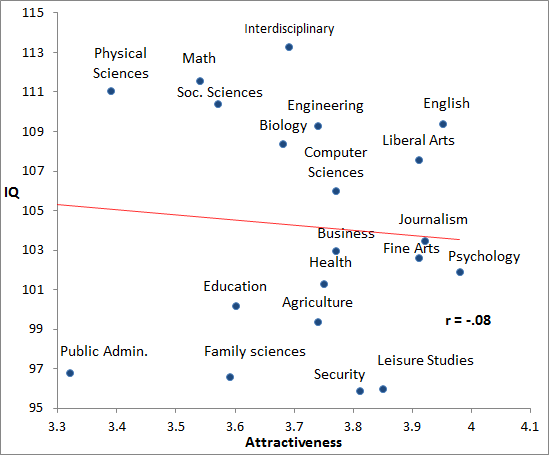Intelligence
Attractiveness and the IQ Levels of College Disciplines
Does the relationship between attractiveness and IQ depend on gender?
Posted October 22, 2013
Guest post by Jason Major, a PhD candidate in Psychology at the University of Edinburgh. He is from Ottawa, Canada.

Guest post by Jason Major, a PhD candidate in Psychology at the University of Edinburgh. He is from Ottawa, Canada.
About a month ago, Sanjay Srivastava, a psychologist at the University of Oregon, performed a somewhat tongue-in-cheek analysis of IQ and hotness among academics, posting it to his blog. The attractiveness data came from a study in 2006, which looked at ratings of university professors from the website RateMyProfessor.com. They were based on how many students described their professors “hot” or “not hot”. What Dr. Srivastava found is that the disciplines with the highest hotness ratings tended to be those nearer to the bottom when ranked by the average IQ of graduate students (IQ was estimated by the Graduate Record Examination). In other words, attractiveness appeared to be negatively correlated with IQ among college professors.
This was an amusing result, which was shared on several other websites. Reading between the lines, it seemed to confirm many people’s intuitions that the hard university subjects are taught by nerdy professors, while the professors for the less-difficult subjects, and possibly their students, are of the cooler sort.

Interestingly though, Srivastava’s result runs counter to much psychological research on attractiveness and intelligence. Generally, studies on this topic have found small positive associations between physical attractiveness and IQ scores. For example, a well-cited study by Zebrowitz and colleagues found a positive correlation of .22 between facial attractiveness and IQ in adults. This raises the question: Why the discrepancy for professors? One confound could be the gender of the raters. In Srivastava’s analysis, the disciplines with low hotness included Computer Science, Math, Engineering and Chemistry. These are the classic STEM fields that are disproportionately occupied by men, at both the student and teaching level. This could account for why professors in these fields didn’t get as many “hot” ratings as professors in more gender-balanced disciplines like Political Science or Biology. On the other hand, maybe professors are such an outlying group that the typical findings about attractiveness and IQ don’t apply to them.
However, thinking about this subject made me wonder how the results would look for actual students in different university disciplines, rather than their professors. I decided to run a short analysis using publically available data from the National Longitudinal Study of Adolescent Health (Add Health). The study was one of the few nationally representative studies that included attractiveness ratings. Participants were rated on attractiveness at around age 23 by interviewers. To get IQ estimates for different college disciplines I used the latest SAT scores from 2012, assuming that average IQ of SAT-takers was 103. I excluded college majors in Add Health with less than five participants.

In the whole sample, the correlation between attractiveness and IQ-level of college major was, as expected, slightly positive (r = .21). So the story was indeed different for undergraduates compared to professors. However, something intriguing happened when I split the sample into men and women. In men the correlation was still positive, but in women it was slightly negative!
When looking for what might have contributed to this unexpected result in women, one thing that sticks out might be the relatively lower attractiveness of women in the high-IQ fields of Math and the Physical Sciences (as well as the Social Sciences excluding Psychology). One could offer many speculations for this finding. Perhaps women who enter these disciplines downplay their attractiveness in order to fit into the predominantly-male environment? Or maybe attractive women choose these fields less often because of a greater fear of gender stereotyping? We should be careful of drawing strong conclusions though because of the small sample sizes for the different college majors in Add Health.

Despite this limitation, there was clearly a different pattern from Srivastava’s analysis for college professors. Better-looking men tended to end up in higher-IQ college disciplines, which is what one would expect from the positive association of attractiveness with IQ. However, the Add Health data suggest something different happening in women. Perhaps there are cultural influences on college major choice in women that act to override the expected pattern. Add Health participants attended university starting around 1998, so maybe things have changed since then. But based on this analysis, further research on this topic could be worthwhile.


